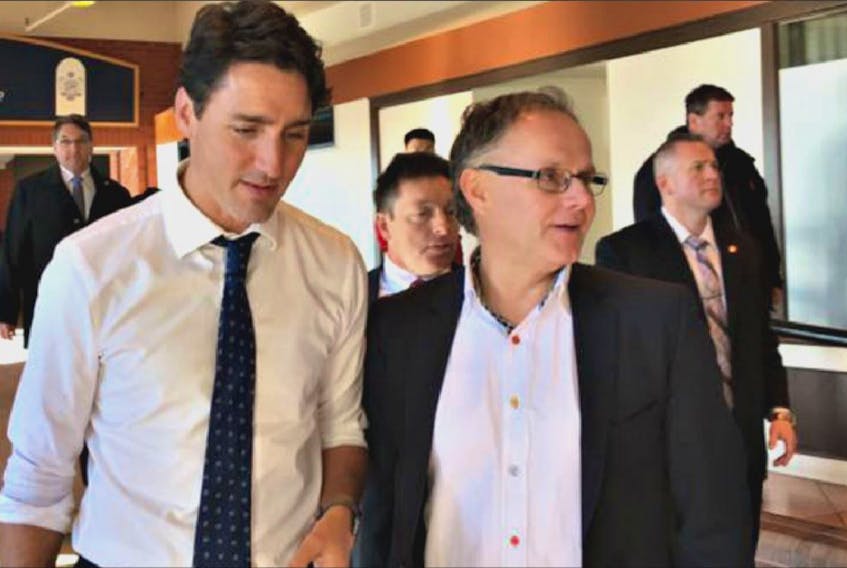For a relatively unknown political commodity, it’s been a big month for one of the Maritimes’ rookie backbench MPs who has found his way to the centre of two of the biggest stories in Canadian politics: small business taxes and the demise of the Energy East pipeline.
But Saint John–Rothesay Liberal MP Wayne Long’s hand in the former matter can be drawn directly to political fallout from the latter, proving that even federal politics boil down to local issues and how they shape local races.
After being the first Liberal MP to speak out against the tax changes, Long doubled down last week by voting against his Prime Minister and his party on a Conservative motion to extend consultations.
To help explain his decision - one that was celebrated locally and nationally - Long told reporters his riding is home to the largest concentration of small businesses in the country. The claim was promptly fact checked as inaccurate by news reports quoting a Canadian Federation of Independent Business 2016 annual report on entrepreneurial cities that listed Saint John in the middle of the pack across Canada where it trailed regional counterparts like Charlottetown, Moncton and Fredericton in terms of the number of business establishments per 100 residents and on the percentage of self-employed residents.
So why does a long-time party loyalist so publicly decide to stop towing the party line? For an answer we need to take a step back and look at the bigger picture surrounding Long’s decision, one that includes the failure of Energy East.
On July 18, Finance Minister Bill Morneau announced the proposed small business reform via a discussion paper.
On September 7, TransCanada announced it had suspended its nearly three-year old regulatory application to build Energy East for 30 days to review how recent NEB changes could “impact the projects' costs, schedules and viability.”
On September 13, Long spoke out publicly against the small business tax reform for the first time, 57 days after it was announced by his government.
On October 2, New Brunswick Premier Brian Gallant told reporters it is realistic to conclude Energy East is dead.
On October 3, Long generated national headlines as the only Liberal MP to support a Conservative motion on the tax plan.
On October 5, TransCanada abandoned plans to build Energy East.
True coincidences are rare in politics, and if you are looking for one now this would not be the best place to start. Let us consider that Long campaigned as an outspoken champion for Energy East, telling the Globe & Mail he would fight for the project every day within a Liberal caucus that was divided on the issue.
TransCanada’s move to suspend its Energy East application for 30 days was a clear signal the project was in trouble, a signal so glaring that New Brunswick’s premier was prepared to acknowledge the project was likely doomed even before the news was official.
In the meantime, it took Long less than a week to pivot from the position he had so clearly staked as Energy East cheerleader-in-chief and re-emerge as the maverick MP for small business. Suddenly, reporters were turning to him as a principal voice of dissent on the tax plan and few were asking him about Energy East.
For Long, it wasn’t much of a gamble. Voters in New Brunswick’s port city famously love a fighter, a voting pattern that helped Progressive Conservatives hold on to half of their caucus – the late Elsey Wayne – in the 1993 federal election. And although Long was kicked off two committees by his party leadership as result of his rebellious vote, he knows that in Atlantic Canada, politicians are rarely punished by voters when they speak out against a sitting Prime Minister of a matching political stripe. Danny Williams and Bill Casey can attest to that.
We are told politics is a team game, and in some ways it is. On election night, bright red, blue and orange graphics cover the election map and broadcasters calculate the winning team and the losers. But the over-arching horse race story that voters are told by pollsters and pundits ultimately breaks down into 338 individual, local races. In the many battleground ridings across Canada that swing back and forth between major parties, local issues matter.
Saint John is one of those battleground ridings, and in the home of Canada’s largest oil refinery no issue was bigger than Energy East, not even small business taxes. Long has deftly changed the channel, hoping to short-circuit the arguments of political rivals who, in the 2019 election campaign, will contend he either failed on Energy East or was abandoned by his party.
- Jesse Robichaud is a public affairs consultant at Ensight in Ottawa. He served as an advisor to former New Brunswick premier David Alward; and worked as a journalist.









